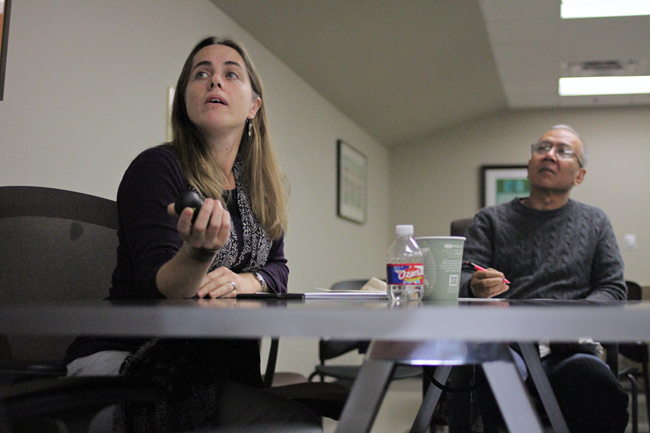Emma Flatt, author and assistant professor of history at the University of North Carolina at Chapel Hill, spoke at the Institute of Historical Studies on Monday about her upcoming book, which focuses on the Deccan Sultanates of South India.
In the book, which she hopes to finish by the end of the academic year, Flatt focuses on the courts, commodities and consumptions of the modern day Deccan states of Maharashtra, Andhra Pradesh and Karnataka in India.
The term “court,” according to Flatt, is the web of people who surround the king and work both with him and each other. This early form of networking allowed people not only to build success but to also live well.
Flatt also spoke about the economic basis to understand the culture she is studying.
“So my initial question when looking into this was how do we understand how individuals of significant cultures and backgrounds move between these
facilities of the world,” Flatt said. “How did they establish negotiation, [how did they] challenge normative behaviors and knowledge in this culturally various courtly world?”
Flatt acknowledged, at the beginning of the lecture, this time period she is working in is a period when there is not a lot of documentation.
From 1400-1600 A.D., Flatt said records show many members of the Islamic community were moving into the Indian region because of the large amounts of precious metals, such as silver and gold.
“The reason for this movement is because people allowed the long-distance trade networks to resettle them financially and logistically,” Flatt said. “There were a lot of commodities and accommodations.”
Flatt also tried to engage in the idea of what “cultural capital” meant to the Deccan. Cultural capital is not an economic exchange, Flatt said, but rather the way in which skills and objects serve as ethical tools. These tools show the way in which humans and objects are related and how they have an effect on each other.
Flatt earned her doctorate in 2009 by focusing on the philosophies of friendship and sociology in medieval South Asia, but she has researched Deccan Sultanates since 2004. Flatt also co-edited a project on the Deccan in 2011 with Daud Ali, University of Pennsylvania South Asia studies associate professor.
Following the lecture, Sumit Guha, UT Asian studies and history professor, said he found the lecture engaging.
“Today’s lecture was rich and thought-provoking while showing us that there is still a bigger part of the picture,” Guha said. “There is also a significance shown between Indian state of building and networking.”
Seth Garfield, history professor and director of the Institute for the Historical Studies, was very pleased with the audience.
“This was a very good workshop, and the audience was really engaged with good questions,” Garfield said.





















